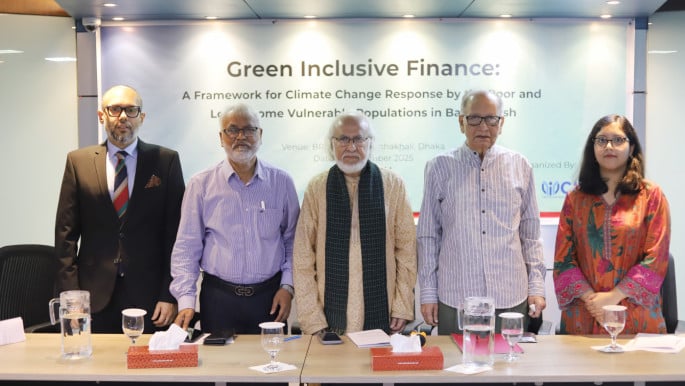News Flash

DHAKA, Nov 11, 2025 (BSS) - Policymakers and development experts at a discussion meeting in Dhaka have called for adopting green inclusive finance as a national framework to link financial inclusion with climate action for the poor and low-income vulnerable populations in Bangladesh.
The event, titled “Green Inclusive Finance: A Framework for Climate Change Response by the Poor and Low-Income Vulnerable Populations in Bangladesh”, was jointly organized yesterday by the Institute for Inclusive Finance and Development (InM) and the Center for Inclusive Development Dialogue (CIDD) at the BRAC Centre Inn, Mohakhali. The meeting was chaired by Dr. Q.K. Ahmad, Chairman of InM.
A keynote paper presented by Dr. Mustafa K. Mujeri, Executive Director of InM and Chairman of CIDD, outlined a strategic framework that integrates poverty reduction, financial inclusion, and climate resilience covering three key pathways including resilience, adaptation and transition.
The paper stressed that tackling climate change and supporting the poor cannot be effectively approached individually. A green inclusive finance system, he argued, would empower vulnerable communities to adapt to climate shocks while transitioning towards sustainable livelihoods, said a press release today.
The discussions in the meeting were enriched by a panel of renowned climate change experts comprising Md. Rashadul Islam, former Director General, NGO Affairs Bureau; and Kazi Kareena Arif, Research Analyst, Change Initiative.
The panelists discussed the relevant issues from the perspective of the poor and low-income vulnerable populations.
They noted that climate adaptation policies often fail to address the realities faced by low-income disadvantaged communities, leaving them disproportionately exposed to the rapidly rising vulnerabilities of environmental risks.
They underscored the need for inclusive financial tools, such as microfinance, micro insurance, easy-access and flexible savings and emergency credit programmes, and much-needed and well-targeted safety nets to enhance resilience of low income the households in climate-prone communities.
The participants from different financial institutions, microfinance and development organizations, and relevant policy bodies discussed practical steps needed to operationalise green inclusive finance at both institutional and community levels.
The meeting concluded with a call for coordinated national efforts, stronger local participation, and targeted investments in climate-vulnerable areas particularly in the coastal belts, haor regions, and flood-prone zones to ensure that no one is left behind in the fight against climate change.
The session ended with a vote of thanks delivered by Arsalan Zaman, Trustee, Center for Inclusive Development Dialogue (CIDD), who expressed appreciation to all speakers, panelists, and participants for their valuable contributions to advancing the national discourse on green inclusive finance.